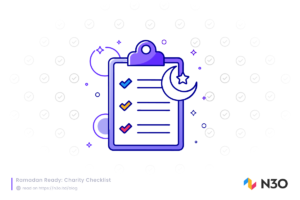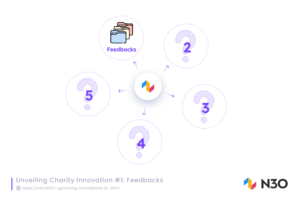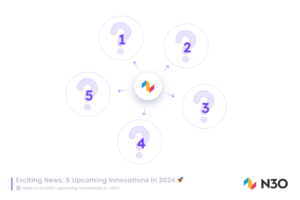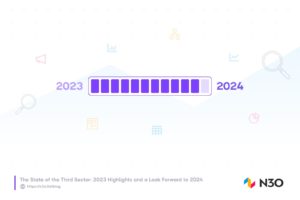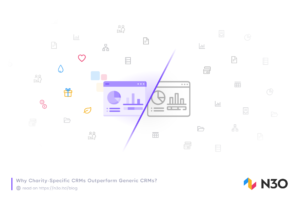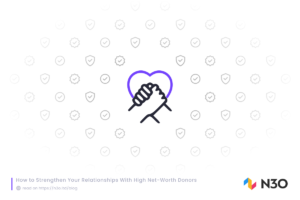As committed, N3O is here to introduce its first innovation of 2024, ‘Feedbacks‘ for charities.
Managing a diverse array of mini-projects presents a complex web of challenges for charities. They face the daunting task of tracking progress, allocating resources, and ensuring transparency with stakeholders – all while effectively utilising their technological infrastructure.
We at N3O deeply understand these multifaceted challenges charities face regularly. To address these, we have introduced a ‘Feedacks’ module in our Engage CRM, which allows end-to-end project management for charity’s mini projects.
This article delves into what the ‘Feedbacks’ feature is and how it optimises your charity’s project workflows.
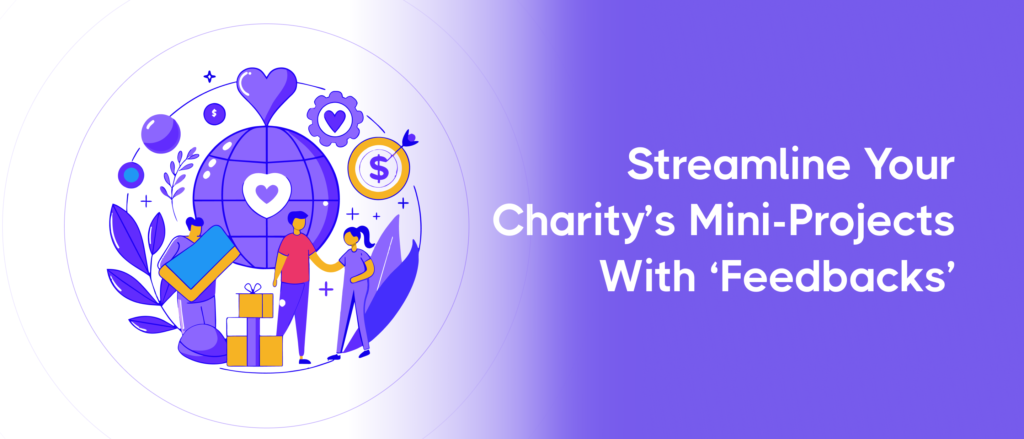
What are Feedbacks?
‘Feedbacks’ refer to a specific type of (charitable giving) mini projects where the donor receives feedback after completion. Such projects can range from constructing a water well or a classroom to building a clinic for the beneficiaries.
The distinction of a ‘Feedback’ project is its personalised and direct communication with donors, informing them about the outcome and impact of their donation.
This contrasts with typical one-off donations, where donors often don’t receive updates on the fundraising campaign’s results. In ‘Feedbacks,’ charities actively update donors on the status of their supported projects.
Why Feedbacks?
The “Feedback’ project enhances charity-donor relationships. Here’s why you should focus on these:
- Enhances Donor Engagement: Regular charity updates and feedback nurture a stronger connection between the donor and the cause.
- Manage Your Projects Centrally: A dedicated ‘Feedbacks’ module helps charities to have a structured approach to managing and executing charitable projects. No more managing via Excel sheets and falling prey to ‘human error’.
- Demonstrates Impact: Charities can utilise this giving type to demonstrate project impacts. It offers donors compelling, tangible evidence of how their contributions make a real-world difference.
- Attracts New Donors: People prefer to contribute to causes where they can see their funds are used effectively and stay informed on progress and outcomes. Projects consistently providing feedback and showing impact are more likely to attract new donors.
How Does It Work?
Engage CRM supports ‘Feedback’ projects with a fully functional ‘Feedbacks’ module. From inception to realisation, it allows charities to set up, manage, and cancel this specialised giving. Here are five key features:
1. Fully Flexible Projects
Charities are involved in a wide range of projects that have unique needs. These could be collecting donations for a school rehabilitation, digging a water well, or setting up clinics, a chicken farm or health centres in communities. The ‘Feedbacks’ feature lets you set the criteria for any of these projects based on their unique nature.
During onboarding, our team sits with you to learn about various projects your charity is running or aims to run. For example, for a water well project, you may want to collect the well’s depth, the location’s GPS coordinates, the donor’s name, etc. For the school classroom project, classroom dimensions, school name, and location are some flexible fields to record. You can collect such data related to these projects in the CRM’s custom fields.
Each project has a scheme which is set up while creating a new ‘Feedback’ project in the Engage CRM, as shown in the following image:
Feedback scheme setup screen in the Engage CRM
2. End-End Pipeline Tracking
Charities often grapple with the challenge of simultaneously monitoring and managing numerous small-scale projects. For example, it is not uncommon to have hundreds of orders for £150 hand pumps during a busy period.
These donations could vary in terms of implementation across different countries, project types, and price points. This variation can lead to poor visibility regarding these projects’ current status and progress. As a result, maintaining control and ensuring each project is implemented correctly and the donor has received timely feedback can be difficult. Therefore, the ‘Feedbacks’ feature has been specifically developed to address this charity concern.
Once a donation has been made, you can track the entire ‘Feedback’ process from when a donation is made to the project’s final report delivery to the donor. See the below example for a sewing machine project:
- A donation is received on the donor’s account, and a sewing machine ‘Feedback’ project is created.
- The ‘Feedback’ is instructed to the “implementing partner” to purchase and distribute a sewing machine to a widow.
- The implementing partner completes the project and adds the relevant info (details, pictures, etc).
- The charity checks the final ‘Feedback’ report from the system.
- The project completion report is automatically sent to the donor via email and/or post.
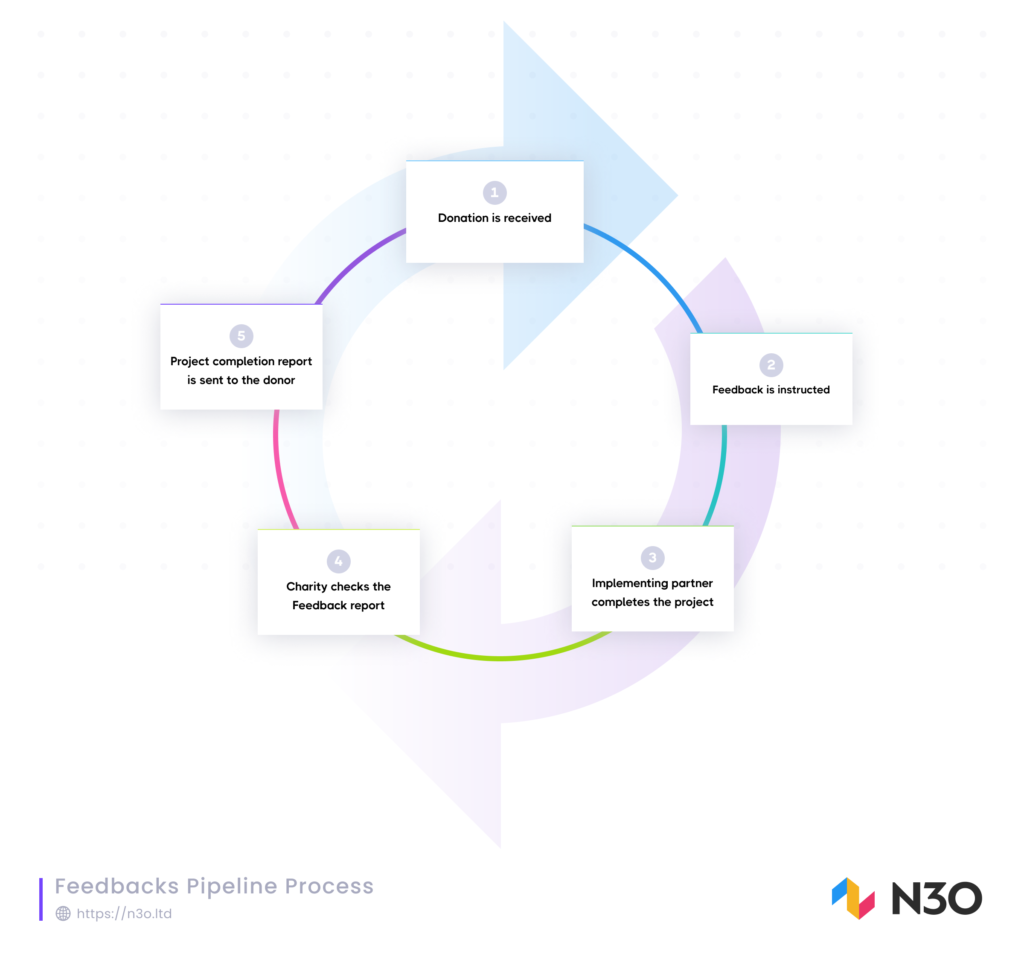
Feedbacks Pipeline Process
A log tells you the pipeline status throughout the various stages of your projects.
Feedback log in the Engage CRM
3. Allocate From Your Website (No Human Intervention)
One of the unique features of ‘Feedbacks’ within the Engage CRM is that it allows you to automate the process from the point of receiving a donation from your website.
With the right setup, this could require just one or two touchpoints from the charity project team in order to complete a ‘Feedback’ project.
With the auto-allocate setup, a donor could choose a ‘Feedback’ project from your website, and this would automatically create a ‘Feedback’ instruction within a queue. The charity representative would need to do a single check to instruct the implementing partner to start the project.
Tip: Although it is possible to bypass this check and auto-instruct, it is safer to have some checks based on our experience.
Then, only a second touch point would be required to check the final report before it is sent back to the donor.
Below is a brief diagram showing the ‘Feedback’ automation from a website donation:
Feedback Automation Process
4. Special Instruct Functionality
The special instruct functionality in this module is unique to N3O and is a powerful method of organising projects at a mass scale. Creating a ‘Feedback’ is the initial step once the donor has donated.
The next step is issuing ‘Feedback’ instructions, which means ‘informing the implementing partner that the ‘Feedback’ project has been sanctioned and they can start the implementation’.
In Engage, when a donation is made for a project, it is entered into a queue based on certain criteria. This allows the charity to select when projects should start implementation in communication with the implementing partners.
The ‘Feedbacks’ module even sends an official PDF instruction to designated implementing partners on the number of projects, the locations and reference numbers so there is no ambiguity.
5. Beautiful and Automated Designs
Upon completion of the project, the final step is to inform the donor how their contributions made it possible. Engage lets you send project completion reports from the system, which saves significant time and resources for the charity. Instead of creating the PDF reports through manual mail merge, the system will automatically populate the fields filled in by the implementing partner into a pre-defined template.
Predesigned report (PDF) templates are designed in the Engage CRM according to your charity’s branding as part of the onboarding. With these templates, charities can maintain consistent and professional communication.
Transform Your Charity’s Mini-Projects Management
With Engage CRM’s ‘Feedbacks’ module, charities can have better oversight of their various projects under work. They can efficiently process a wide range of projects with unique requirements from initiation to completion. Overall, the ‘Feedbacks’ module streamlines charity operations and enhances donor relationships.
To learn about how you can benefit from the ‘Feedbacks’ feature, visit the feature page here or reach out to us at mail@n3o.ltd.
